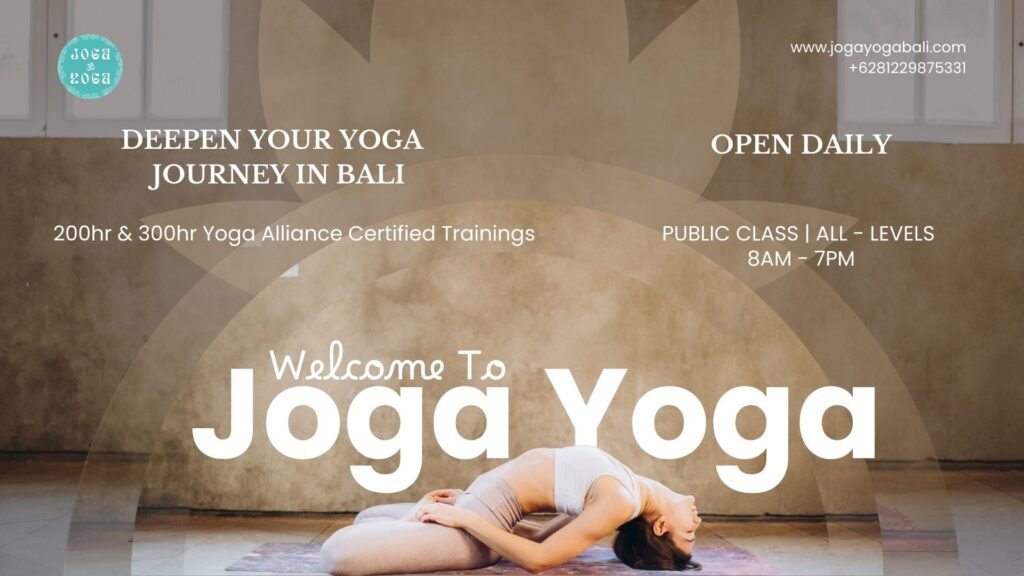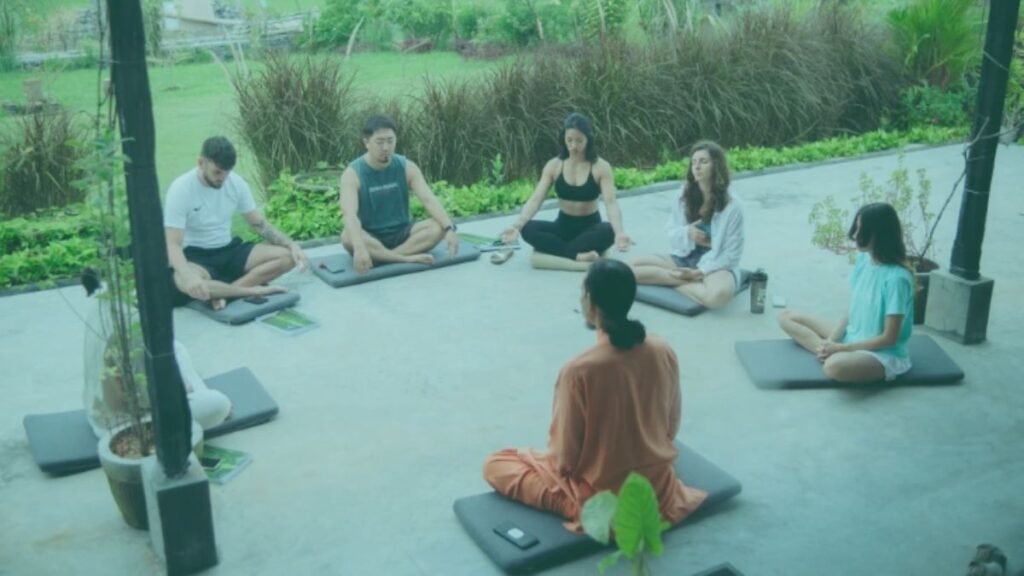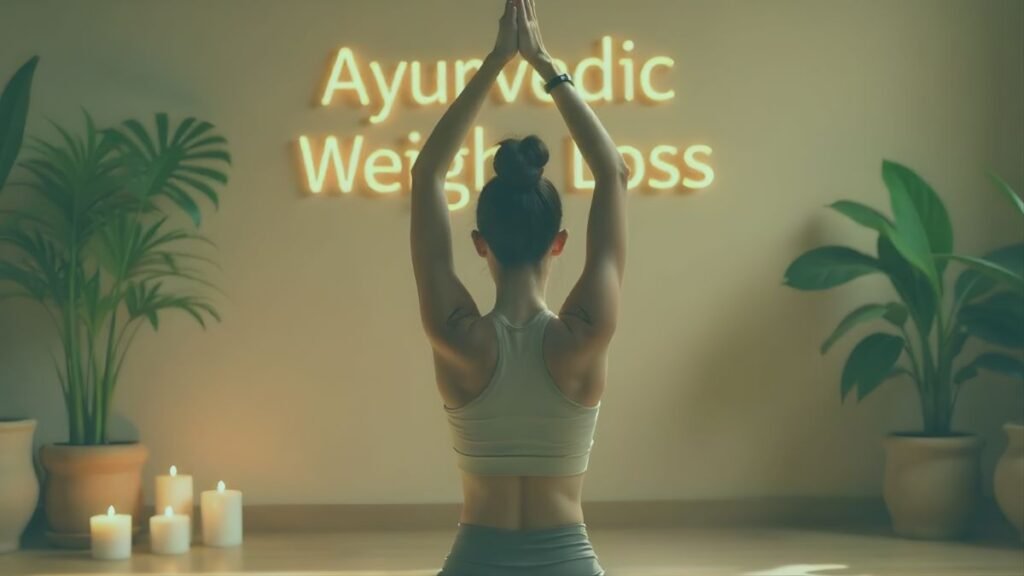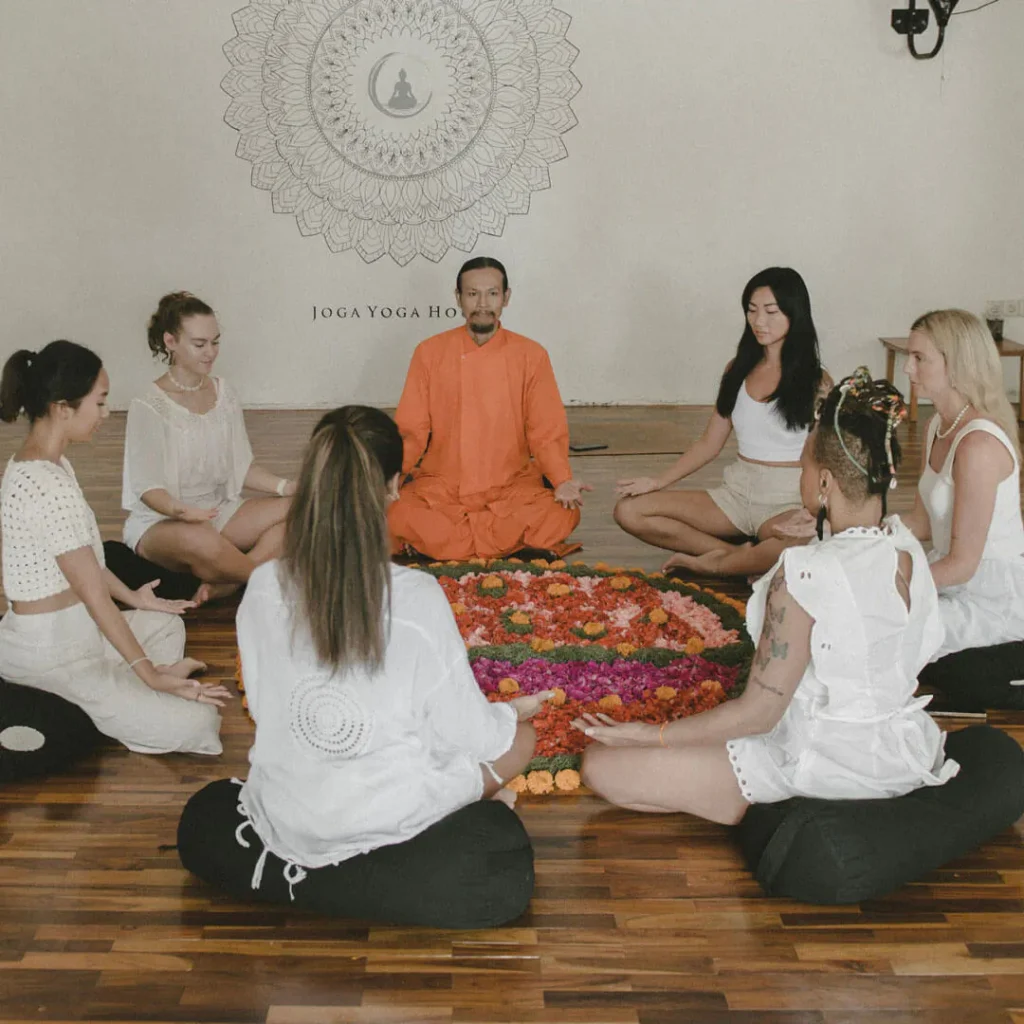In Bali, a yoga teacher training program costs between €1,049 and €3,650 depending on program length and accommodation. Non-accommodation options start at €1,049, while full 200-hour programs with private rooms cost €2,450–€2,999. Packages include tuition, meals, Yoga Alliance certification, excursions, and more.
What’s the Average Cost of a Yoga Teacher Training in Bali?
The average price for a 200-hour yoga teacher training in Bali in 2025 is between $1,000 and $2,500, depending on the school and level of accommodation.
By comparison, similar 200-hour programs in the United States or Europe often cost $2,500 to $4,000 or more. This price difference makes Bali one of the most affordable yet high-quality destinations for yoga teacher training worldwide.
Joga Yoga’s 2025–2026 Program Costs
At Joga Yoga, we offer different teacher training programs to fit your journey. Prices vary by program length and accommodation type. Every option includes tuition with experienced instructors, Yoga Alliance certification, vegetarian or vegan meals, books, and special Bali experiences.
200-Hour Multi-Style Yoga Teacher Training (22 nights)
| Accommodation Type | Price (€) | What You Get |
| Non-Accommodation | 1,550 | Tuition, YA certification, meals, books, excursions |
| Dorm Room | 1,699 | Shared room with AC, meals, books, excursions |
| Twin Share | 1,799 | Twin-shared room, meals, books, excursions |
| Standard Private | 2,450 | Private room, meals, books, excursions |
| Deluxe Private | 2,999 | Deluxe private room, meals, books, excursions |
100-Hour Foundation Yoga Teacher Training (10 nights)
| Accommodation Type | Price (€) | What You Get |
| Non-Accommodation | 1,049 | Tuition, YA certification, meals, books, excursions |
| Dorm Room | 1,199 | Shared room with AC, meals, books, excursions |
| Twin Share | 1,499 | Twin-shared room, meals, books, excursions |
| Standard Private | 1,599 | Private room, meals, books, excursions |
| Deluxe Private | 1,699 | Deluxe private room, meals, books, excursions |
300-Hour Advanced Yoga Teacher Training (29 nights)
| Accommodation Type | Price (€) | What You Get |
| Non-Accommodation | 2,099 | Tuition, YA certification, meals, books, excursions |
| Twin Share | 3,099 | Twin-shared room, meals, books, excursions |
| Standard Private | 3,299 | Private room, meals, books, excursions |
| Deluxe Private | 3,650 | Deluxe private room, meals, books, excursions |
Upcoming Training Dates
200-Hour and 300-Hour YTT Programs
- 6–27 October 2025 – 2 Spots Left
- 3–24 November 2025 – 2 Spots Left
- 1–22 December 2025 – Early Bird Discount
- 5–26 January 2026 – Limited Spots Available
- 2–23 February 2026 – Limited Spots Available
100-Hour Foundation YTT Programs
- 6–16 October 2025 – 2 Spots Left
- 3–13 November 2025 – 2 Spots Left
- 1–11 December 2025 – Early Bird Discount
What’s Included in the Training Fee?
When you join a Joga Yoga training in Bali, your fee covers far more than just classes. Every package is designed to give you a complete experience so you can focus fully on your practice.
Your fee includes:
- Tuition with accredited international teachers
- Yoga Alliance Certification on completion
- Nutritious vegetarian or vegan breakfasts and lunches
- Airport pickup at arrival
- One traditional Balinese massage
- Excursion to Bali’s sacred water temple
- Sauna and cold plunge recovery sessions
- All books, resources, and a student portal for continued learning
- Optional surf lesson and evening kirtan music nights
Extra Costs to Budget For
While most essentials are included, you should plan for a few extra costs outside the training fee.
Flights to Bali
Airfare is not included in your program fee. Prices vary by country of origin but can range from €400–€900 for round trips from Europe or North America.
Visa & Travel Insurance
Depending on your nationality, you may need a 30-day tourist visa or extend it for longer programs. Travel insurance is highly recommended for health and trip coverage.
Spending Money (dinners, cafes, souvenirs)
Breakfast and lunch are provided, but dinners are not included. Plan a budget for evening meals, coffee shops, or exploring Bali’s vibrant food scene.
Yoga Gear / Personal Needs
Bring your own mat, blocks, and any preferred yoga props. You may also want to budget for personal wellness needs, spa visits, or extra excursions.
How Bali Compares with Other Popular Yoga Teacher Training Destinations
Bali has become one of the most sought-after locations for yoga teacher training. One reason is the balance between quality and affordability.
- Bali: Most 200-hour yoga teacher training programs cost €1,500–€3,000, depending on accommodation and inclusions. You also get the benefit of a tropical setting, healthy plant-based meals, and a vibrant international yoga community.
- India: The birthplace of yoga offers the most affordable trainings, often €1,200–€2,000 for a 200-hour course. India is great for tradition and depth but can be more basic in terms of facilities.
- Europe/USA: Teacher trainings in Western countries often cost €2,500–€4,000 or more. These programs can be high-quality but are usually more expensive due to living costs.
For many students, Bali provides the best of both worlds: high standards with Yoga Alliance accreditation, modern facilities, and an inspiring environment at a lower price than most Western destinations.
How to Choose the Right Training Beyond Price
While cost is important, choosing the right yoga teacher training should include more than just numbers. Here are key factors to guide your decision:
- Accreditation (Yoga Alliance certified): Ensure the school is registered with Yoga Alliance so your certificate is recognized worldwide.
- Class size and teacher attention: Smaller groups allow for more personal feedback and support.
- Curriculum depth: Look for a balanced program covering asanas, philosophy, anatomy, pranayama, and teaching methodology.
- Accommodation and food quality: Your living environment impacts your overall experience and energy during the course.
- Student reviews: Testimonials and alumni feedback provide insight into the school’s community and teaching style.
By considering these factors alongside cost, you can choose a program that offers true value and supports both your personal growth and teaching journey.
Ready to Start Your Journey?
Join Joga Yoga’s Transformative Teacher Training in Bali
With over 2,000 graduates and a 4.8★ Yoga Alliance rating, Joga Yoga blends expert instruction with Bali’s natural beauty. Every training is designed for personal growth, professional certification, and unforgettable cultural experiences.
Apply Now for Upcoming Trainings

What our graduates say:
“The Joga Yoga training was life-changing. The teachers are supportive, the classes are deep, and Bali itself is the perfect place to immerse in yoga.” – Sophie, 200-hour graduate
“I felt seen and supported every day. The small group size made such a difference. I left not only as a teacher but as part of a family.” – David, 300-hour graduate
FAQs About Bali Yoga Teacher Training Costs
Do I need accommodation to join?
No, accommodation is optional. You can choose a non-accommodation package and stay nearby while still enjoying full tuition, meals, and all program inclusions.
What deposit secures my spot?
A deposit of €280 secures your place in any upcoming training. The remaining balance can be paid before the course start date.
Are meals always included?
Yes. All packages include daily vegetarian or vegan breakfasts and lunches. Dinners are not included, giving students freedom to explore Bali’s many cafes and restaurants.
Do you offer discounts for locals or early bird signups?
Yes. Joga Yoga offers special discounts for Indonesian residents as well as early bird rates. Early signups are the best way to secure reduced prices.






